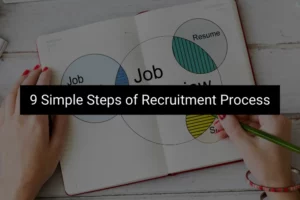What makes an ideal recruiter? Recruiters who are ideal don't only do their jobs well. They make certain that their organization continues to attract and retain outstanding employees. Recruiters don't need to have a background in human resources. Recruiting skills can be developed through experience in sales, design, marketing, customer service, coding, and a range of other industries. Regardless of their origins, there are a few characteristics that all hire-worthy recruiters should possess.

How to be a successful recruiter:
Make connections.
Recruiters must reject more prospects than they hire, according to statistics. The good ones handle it with elegance, turning rejections into connections. It should be a common practice to send a letter of refusal after the interview. Good recruiters, on the other hand, stand out by sending individualized emails and cultivating genuine relationships, even when they're dismissing candidates. A skilled recruiter recalls minor, positive information from their contacts with rejected applicants and incorporates them into their messaging to make them more personal. Candidates' strengths are highlighted, and they may even be suggested for other employment. They also keep in touch in case there are any future openings.
9 Simple Steps of Recruitment Process Click Here>>>
Consider the future.
Recruiters who bring value to their firm don't only start looking for prospects when a job opportunity is announced. They've begun to construct pipelines and maintain contact with previous applicants. They build a strong network by engaging passive applicants. They know where to seek experienced individuals (like GitHub for coders) and how to find new talent in unusual locations (like obscure Slack channels.) They're not scared to try out social media recruiting and see how it can help them. They work with managers to estimate staffing needs if they perceive a department increasing. They go to HR events to keep up with the latest recruitment trends. HR is all about growth, both for individuals and for businesses, and a skilled recruiter understands this.
Make a good impression on recruiting managers
Conflicts of interest can lead to disagreements with recruiting supervisors, which recruiters must handle. An effective recruiter must figure out how to deal with these variances while also balancing the demands of hiring managers. Candidate experience is a hot topic these days. However, hiring manager experience is also crucial. Keep in mind that recruiting managers may not have the time or expertise to fully comprehend the complete hiring process. Good recruiters use their experience to point out problems that hiring managers could miss on their own, such as subtle signals that an applicant could be a potential toxic coworker who undermines their team.
Recruiters that do their job well strive to figure out how each management thinks. Because some hiring managers may want to choose between a few top applicants, recruiters should perform in-depth screening interviews and ensure that there are no critical deal-breakers following. Another recruiting manager may choose to review resumes on their own time. In this situation, a skilled recruiter concentrates on locating qualified applicants while leaving the evaluating and interviewing to the hiring manager.
How to Become a Human Resource Manager? Click Here>>>
Maintain an open mind.
Recruiters who are good at their jobs know not to judge a book by its cover or a candidate by their resume. A marketing manager, without a doubt, can write a fascinating CV, and a salesperson, without a doubt, can present themselves in the most engaging manner. Is this, however, a guarantee that they're good at their job? Should a recruiter turn down a developer who has a sloppy resume? Recruiters should look for evidence that candidates' talents fit the job requirements by reading between the lines.
Qualified individuals can be identified using operational and behavioral interview questions. Recruiters could request particular information or offer assignments to measure how candidates handle job responsibilities. Recruiters who emphasize the value of diversity over traditional prerequisites, on the other hand, stand out. They recommend a candidate who, although not having a stereotyped background, they believe is passionate enough to bring new ideas to their team. An effective recruiter will consider a candidate who is a 'culture add' – not a 'culture fit' – rather than employing another 'beer buddy.'
Empathize
To better understand and connect with someone, you must put yourself in their shoes. And by "everyone's" shoes, I mean "everyone's" shoes. To grasp candidate criteria, good recruiters must delve deeply into the demands of hiring managers. Hiring managers would rather receive 5 perfect resumes than 50 that don't fit their criteria. Recruiters, on the other hand, must consider the perspective of the candidate. If they want to recruit exceptional people, they must first figure out what matters to them and then look at what an employer can provide. If recruiters try to dominate the conversation by overselling positions and emphasizing how amazing their organization is to work for, they won't be able to get to know their candidates.
Recruiters should thoroughly investigate each role they recruit for in order to stand out. Thorough research entails more than simply reading a job description or asking the hiring manager for a list of desirable abilities. To hire web programmers, good recruiters don't need to be experts in JavaScript, but shadowing a member of the IT department or completing a fast online course might help them gain a better understanding of what a programmer performs and what extra skills they should be searching for.
10 Steps of Human Resource Planning Click Here>>>
Take on multiple roles
You can read a lot of job descriptions for recruiters or ask any skilled recruiter you know to describe a normal day at work, but nothing seems to completely express what they do. That's because recruiters deal with a wide range of people with varying demands on a daily basis. To create engaging job ads, good recruiters must be familiar with marketing methods. They must behave in a salesman-like manner. To better comprehend the reactions of candidates, they should have a basic understanding of psychology. Recruiters may also use 'PR techniques' at recruitment events to improve their company's employer brand. They must, above all, be team players who collaborate with their peers.
A recruiter's job isn't – or shouldn't be – isolated from the activities of their organization. If they don't communicate with their team members, how would they know what kind of individual would be a good fit? Participating in the onboarding process and receiving regular feedback from new hires can help them have a better grasp of the overall hiring process. They can then improve the accuracy and appeal of job descriptions and offer letters. Recruiting is about constantly adjusting recruiting tactics to meet individual hiring needs, not about 'one-size-fits-all' processes and procedures that function well in theory.
Self-Improve
There is no such thing as a terrible experience for a good recruiter. Mistakes provide us with valuable lessons. When they don't get the desired results, they try to figure out what went wrong and how to avoid it in the future. They celebrate both little and large victories, such as a speedy hire or landing a candidate for a difficult-to-fill position. They are, however, always looking for methods to improve and they must keep up with all current HR advances in order to stay ahead of the competition. How can HR technology help them perform better? What are the most recent trends in recruiting and what are the best techniques for social media recruiting?
What is the Human Resource Information System? Objectives of HRIS. Click Here>>>
How do new rules, such as the EU's General Data Protection Regulation (GDPR), affect how they source? These are the questions that successful recruiters ask themselves and look for answers to. HR has gone a long way since its inception in the commercial world, and it continues to evolve. Recruiters must stay current in order to turn problems into opportunities and mistakes into cautionary tales.
5 Secrets to Being a Good Recruiter
The talent acquisition industry is booming, and you've decided to work as a recruiter or a head hunter. How, though, do you do it? It? To begin, a Recruiter works for a commission, which is paid whenever he completes the entire recruitment process, which means he will receive his commission once his candidate is hired by the Client Company.
Read on to know the 5 secrets to be a good recruiter with ease.
1. Research the entire recruitment process. A Recruiter must be active in every stage of the process, from obtaining an opening from the Client to screening suitable applicants to following up with them until their selection is complete. At any given time, you must be aware of the status of each role that has been allocated to you.
2. Using your Recruiting skills, your goal should be to place the most applications in the shortest amount of time possible. An excellent Recruiter is dependable. Both the Client Company and the job seekers want a dependable Recruiter with whom they can work throughout the process. If necessary, a Recruiter can serve as a guiding light for both the candidate and the Employer, guiding them to a positive outcome. A recruiter's job is to move the employment contract forward while maintaining constant control over the issue.
When an applicant is put in a company that meets his needs, he can advance in his career. Similarly, an employer who selects a candidate who meets the job requirements believes he has found the proper fit for him.
3. A recruiter's job entails a lot of information gathering. In order to gather answers to all of his questions from both the Client and the applicant, a recruiter must be an excellent listener. Listening attentively can lead to answers to many questions. When you use what you've learned at work, it's much easier to get through a contract.
7 Effective Talent Acquisition Strategies in 2021 Click Here>>>
4. There are additional advantages to being a good listener. When you listen to people, they feel valued and not ignored. They get enamored with you. All of this leads to others believing in you. When it's your turn to speak, the other party will listen attentively and respect you.
A recruiter's role also includes serving as a conduit between the employer and the candidate. He should make certain that the two do not misunderstand each other. This will assist you in developing relationships and, as a result, increasing the number of positions filled, which is exactly what you want to happen!
5. Your language and speaking abilities are also important factors to consider. Always strive to speak in comprehensible English. Always interact in a professional manner. You should not be discouraged if your candidate is not chosen. Respectfully follow the Recruitment Method. On the other side, you can boost your educational qualifications by attending numerous workshops or classes. When you have the necessary expertise, the entire recruitment process will appear to be simpler. Simply follow your instincts and common sense, and you'll be OK.
In this article, some points are taken from the website https://resources.workable.com/.
For Human Resource, Payroll and many more HR Services, visit our website https://lingueeglobal.com/



